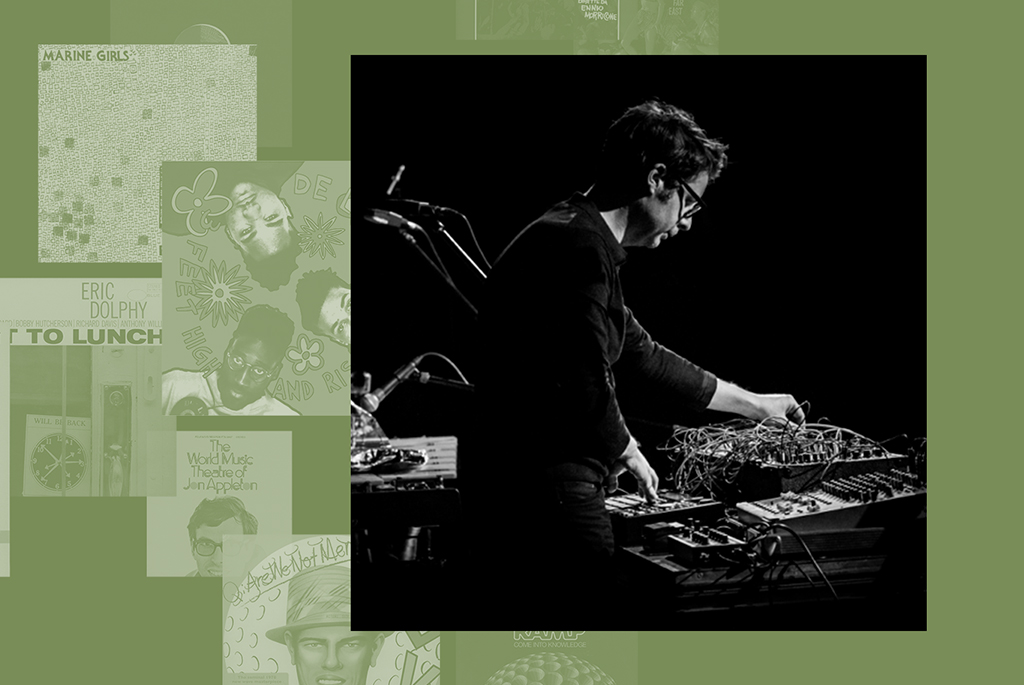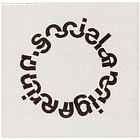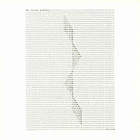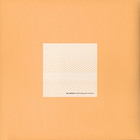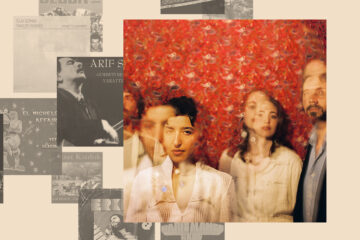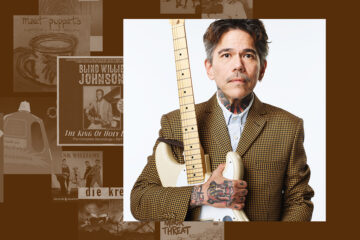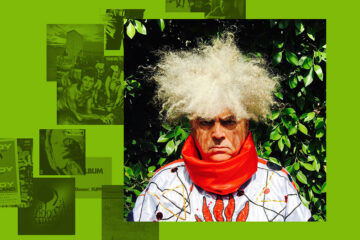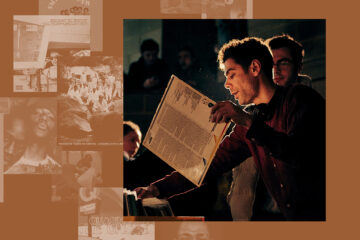If Jan Jelinek doesn’t reinvent himself, he reinvents others. It’s pretty clear now that Ursula Bogner didn’t exist and that the albums by the synthesizer-loving pharmacist released on Jelinek’s own label, Faitiche, were probably just another project by the producer with the many pseudonyms. The Berliner’s versatility was already proven by his debut album »Loop-Finding Jazz Records«, released 15 years ago, which is now considered one of the most important electronic records of the still young century. Introspective, sometimes self-forgetful tape music rubs up against crashing sample art. Jelinek gave one of his many other projects the title »Gesellschaft Zur Emanzipation Des Samples« (Society for the Emancipation of the Sample) for good reason.
Jazz has always been a big part of Jan Jelinek’s experimental, dub-infused techno productions and sonic art pieces. This is still true in his latest album, »Schaum,« a collaboration with Japanese vibraphonist Masayoshi Fujita released on Faitiche. The album follows a 2013 LP and an EP, showing how jazz elements fit in with Jelinek’s intricate loops. But jazz is just one of many references in Jelinek’s ever-expanding sonic universe. His list of ten favourite albums shows just how diverse and surprising his musical influences are. It includes hip hop with samples, Thatcher-era post-punk and radical minimal Detroit techno. It’s a selection of music in alphabetical order that’s as diverse and surprising as Jelinek’s own music.
Related reviews
1 – »The World Music Theatre of Jon Appleton« by Jon Appleton, Folkways, 1974
In the realm of musique concrète, Jon Appleton stands out as my favourite producer. Unlike the Parisian school centred around the GRM Studio, Appleton embraced pop culture within his collages, adding a playful element that sets him well apart from his peers in the genre.
2 – »On the Other Ocean« by David Behrman, Lovely Music, 1977I think it was Gordon Mumma who said in an interview that he had the title track played at his wedding. It was probably a perfect choice for the occasion. No other piece strikes such a balance between beauty and restraint, avoiding any hint of kitsch.
3 – »3 Feet High and Rising« by De La Soul, Tommy Boy, 1989This concept album blends sampledelic hip hop with Johnny Cash and the Detroit Emeralds, resulting in undeniable hits. It was THE record of my youth. It’s nice hip hop by nice people—but that’s exactly what you can accuse the record of.
4 – »Q: Are We Not Men? A: We Are Devo!« by Devo, Virgin, 1978Admittedly, while not every track on the album is a hit, songs like »Uncontrollable Urge« and »Mongolid« showcase Devo’s genius. Devo managed to blend shrill art-punk with the catchy hooks of a high school prom anthem. This balance proved elusive for others, as evidenced by the demise of bands like the B52s. The album also marks an era when Brian Eno was still producing interesting records.
5 – »Out to Lunch!« by Eric Dolphy, Blue Note, 1964Find it at hhv.de on LP
This album grows with each listen, revealing Dolphy’s elegant quirkiness that manages to be abrasive without being jarring. Have you ever listened to »Gazelloni« while driving in rush hour traffic? Suddenly the stress of the commute turns into a hip happening.
6 – »Minimalism II« by Terrence Dixon, Background, 2000Perhaps the most uncompromising minimal techno album to date, Dixon’s »Minimalism II« embraces radical simplicity and his signature knack for hypnotic loops. This approach sets the album apart, venturing beyond the confines of minimal techno and establishing its own unique identity. Sadly, Dixon remains one of the genre’s unsung heroes, often overshadowed by his Detroit contemporaries.
7 – »Voodoo Exotic Music From Polynesia And The Far East« by Robert Drasnin, Tops, 1959An exotica album was a must for this list, of course, and I just love the fantastical kitsch of Martin Denny, Les Baxter and Arthur Lyman. And it’s true what the critics say: If you know one Exotica record, then you know them all. That’s why I chose Robert Drasnin at this point, who may not be revolutionising the world of synthesised bird calls, but does add a touch of uniqueness with his hard-to-find orchid sound.
8 – »Beach Party« by Marine Girls, Whaam! Records, 1981Find it at hhv.de on LP
Tracy Thorn, Gina [Hartman] and Jane Fox deliver melancholy minimalist pop on this gem from the wonderful Cherry Red Records [where the LP was re-released in 1987 and most recently in 2014 – editor’s note]. The music carries the weight of the Thatcher-era, yet it became the soundtrack of my youthful summers spent swimming in the gravel pits.
9 – »Giù la Testa« by Ennio Morricone, Cinevox, 1971Find it at hhv.de on LP
A Morricone album is essential for any top ten list, yet Morricone’s full-length records tend to suffer from over-variations on a theme that wear down even the greatest arrangement. So I chose »Giù la Testa,« an album that avoids that pitfall while still delivering the soaring vocals of the iconic title track as if plucked out of a hat.
10 – »Come Into Knowledge« by Ramp, Blue Thumb Records, 1977Like Morricone, Roy Ayers is one of the great constants in my life. If I were to build an altar, the faces of these two would be on it. Ramp is the most successful work in Ayers’ oeuvre: minimalist arrangements, wonderful instrumentation and almost spiritually repetitive vocals. In addition to the two big hits, there are seven other tracks here that only really come into their own later on.

